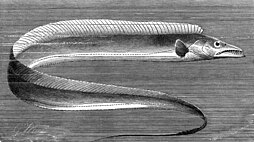The cutlassfishes are about 45 species of predatory ray-finned fish in the family Trichiuridae of the order Scombriformes found in seas throughout the world. Fish of this family are long, slender, and generally steely blue or silver in colour, giving rise to their name. They have reduced or absent pelvic and caudal fins, giving them an eel-like appearance, and large fang-like teeth.[1]
| Cutlassfish | |
|---|---|

| |
| Trichiurus lepturus | |
| Scientific classification | |
| Domain: | Eukaryota |
| Kingdom: | Animalia |
| Phylum: | Chordata |
| Class: | Actinopterygii |
| Order: | Scombriformes |
| Suborder: | Scombroidei |
| Family: | Trichiuridae Rafinesque, 1810 |
| Genera | |
See text for species. | |
Some of the species are known as scabbardfishes or hairtails; others are called frostfishes because they appear in late autumn and early winter, around the time of the first frosts.
Classification
editThis list of species follows FishBase:[2]
- Subfamily Aphanopidinae Gill, 1863
- Genus Aphanopus
- Aphanopus arigato Parin, 1994
- Aphanopus beckeri Parin, 1994
- Aphanopus capricornis Parin, 1994
- Aphanopus carbo Lowe, 1839 (Black scabbardfish)
- Aphanopus intermedius Parin, 1983 (Intermediate scabbardfish)
- Aphanopus microphthalmus Norman, 1939 (Smalleye scabbardfish)
- Aphanopus mikhailini Parin, 1983 (Mikhailin's scabbardfish)
- Genus Benthodesmus Goode & Bean, 1882
- Benthodesmus elongatus, Clarke, 1879 (Elongate frostfish)
- Benthodesmus macrophthalmus, Parin & Becker, 1970 (Bigeye frostfish)
- Benthodesmus neglectus, Parin, 1976 (Neglected frostfish)
- Benthodesmus oligoradiatus, Parin & Becker, 1970 (Sparse-rayed frostfish)
- Benthodesmus pacificus, Parin & Becker, 1970 (North Pacific frostfish)
- Benthodesmus papua, Parin, 1978 (Papuan frostfish)
- Benthodesmus simonyi, Steindachner, 1891 (Simony's frostfish)
- Benthodesmus suluensis, Parin, 1976 (Philippine frostfish)
- Benthodesmus tenuis, Günther, 1877 (Slender frostfish)
- Benthodesmus tuckeri, Parin & Becker, 1970 (Tucker's frostfish)
- Benthodesmus vityazi, Parin & Becker, 1970 (Vityaz' frostfish)
- Genus Aphanopus
- Subfamily Lepidopodinae, Gill, 1863
- Genus Assurger
- Assurger anzac Alexander, 1917 (Razorback scabbardfish)
- Genus Eupleurogrammus
- Eupleurogrammus glossodon, (Bleeker, 1860) (Longtooth hairtail)
- Eupleurogrammus muticus, (Gray, 1831) (Smallhead hairtail)
- Genus Evoxymetopon
- Evoxymetopon macrophthalmus Chakraborty, Yoshino & Iwatsuki, 2006[3]
- Evoxymetopon moricheni Fricke, Golani & Appelbaum-Golani, 2014[4]
- Evoxymetopon poeyi Günther, 1887 (Poey's scabbardfish)
- Evoxymetopon taeniatus Gill, 1863 (Channel scabbardfish)
- Genus Lepidopus
- Lepidopus altifrons, Parin & Collette, 1993 (Crested scabbardfish)
- Lepidopus calcar, Parin & Mikhailin, 1982 (Hawaiian ridge scabbardfish)
- Lepidopus caudatus, (Euphrasen, 1788) (Silver scabbardfish)
- Lepidopus dubius, Parin & Mikhailin, 1981 (Doubtful scabbardfish)
- Lepidopus fitchi , Rosenblatt & Wilson, 1987 (Fitch's scabbardfish)
- Lepidopus manis, Rosenblatt & Wilson, 1987 (Ghost scabbardfish)
- Genus Assurger
- Subfamily Trichiurinae Rafinesque, 1810
- Genus Demissolinea
- Demissolinea novaeguineensis, Burhanuddin & Iwatsuki, 2003 (New Guinean hairtail)
- Genus Lepturacanthus
- Lepturacanthus pantului, (Gupta, 1966) (Coromandel hairtail)
- Lepturacanthus roelandti (Bleeker, 1860)
- Lepturacanthus savala, (Cuvier, 1829) (Savalani hairtail)
- Genus Tentoriceps
- Tentoriceps cristatus, (Klunzinger, 1884) (Crested hairtail)
- Genus Trichiurus
- Trichiurus auriga, Klunzinger, 1884 (Pearly hairtail)
- Trichiurus australis Chakraborty, Burhanuddin & Iwatsuki, 2005[5]
- Trichiurus brevis, Wang & You, 1992 (Chinese short-tailed hairtail)
- Trichiurus gangeticus, Gupta, 1966 (Ganges hairtail)
- Trichiurus lepturus, Linnaeus, 1758 (Largehead hairtail)
- Trichiurus margarites, Li, 1992
- Trichiurus nanhaiensis, Wang & Xu, 1992
- Trichiurus nickolensis, Burhanuddin & Iwatsuki, 2003 (Australian short-tailed hairtail)
- Trichiurus russelli, Dutt & Thankam, 1966 (Short-tailed hairtail)
- Genus Demissolinea
Timeline of genera
edit
References
edit- ^ Johnson, G.D.; Gill, A.C. (1998). Paxton, J.R.; Eschmeyer, W.N. (eds.). Encyclopedia of Fishes. San Diego: Academic Press. p. 190. ISBN 0-12-547665-5.
- ^ Froese, Rainer; Pauly, Daniel (eds.). "Family Trichiuridae". FishBase. January 2006 version.
- ^ Chakraborty, Yoshino & Iwatsuki (2006). "A new species of scabbardfish, Evoxymetopon macrophthalmus (Scombroidei: Trichiuridae), from Okinawa, Japan". Ichthyological Research. 53 (2): 137–142. doi:10.1007/s10228-005-0319-x.
- ^ Fricke, R., Golani, D. & Appelbaum-Golani, B. (2014): Evoxymetopon moricheni, a new cutlassfish from the northern Red Sea (Teleostei: Trichiuridae). Ichthyological Research 61 (3): 293–297.
- ^ Anirban Chakraborty; Andi Iqbal Burhanuddin; Yukio Iwatsuki (2005). "A new species, Trichiurus australis (Scombriformes: Trichiuridae), from Australia". Ichthyological Research. 52 (2): 165–170. doi:10.1007/s10228-005-0268-4.
- Sepkoski, Jack (2002). "A compendium of fossil marine animal genera". Bulletins of American Paleontology. 364: 560. Archived from the original on 2011-07-23. Retrieved 2011-05-19.
External links
edit


